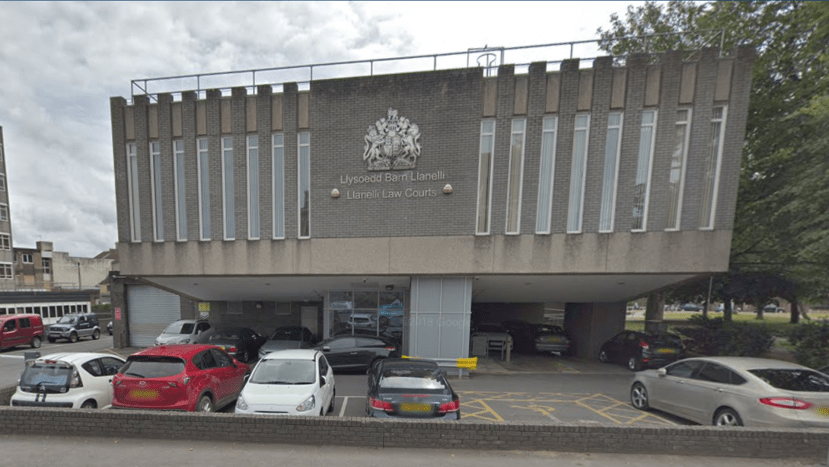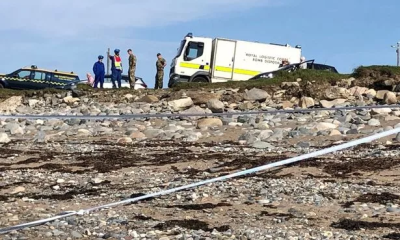News
£141m investment in fossil fuels criticised

MASS data released this week by Pembrokeshire Friends of the Earth (Oct 30) reveals that Pembrokeshire Council (as part of the Dyfed Council Pension Fund) has £64.8million of public money directly invested through workers pension funds in fossil fuel companies like BP and Shell with a further projected £76.5million in indirect fossil fuel investments.
The research shows that Pembrokeshire County Council has over 8% of its pension fund directly invested in fossil fuels, and money is invested into multinational fossil fuel companies including BP, Shell and BHP Billiton
Eleanor Clegg of Friends of the Earth said: “Many people working for Pembrokeshire Council will be concerned to learn that their future is tied up with such a risky and polluting industry. When governments do act to prevent dangerous climate change, the business model for fossil fuel companies will be over, and that day is fast approaching. And, if oil and gas companies keep on drilling in their final days, it will make climate change far worse – it is the right decision both financially and ethically for Pembrokeshire County Council to divest as soon as possible.”
This is the first time that the £231 billion investments of local government public money have ever been broken down and released publicly, and their exposure to fossil fuels quantified. The data shows that overall the 192 councils in the UK have £14 billion invested in fossil fuels via their pension funds. Three quarters of these direct fossil fuel shareholdings are in only ten companies, headed by BP and Shell.
80% of fossil fuel reserves need to remain in the ground to avoid catastrophic climate change. Consequently, there has been growing concerns about the long-term financial risks of fossil fuel investments. A recent analysis found that California’s public pension funds, CalPERS & CalSTRS, incurred a combined loss of over $5 billion in the last year alone from their holdings in the top 200 fossil fuel companies.
Friends of the Earth said in a statement: “This data offers the residents of Pembrokeshire the information they need to ask why the Council is choosing to invest in risky oil, gas or coal. Instead the Council could reinvest this money into building new homes, clean renewable energy or public transport.”
Eleanor Clegg also told The Herald: “Most fund members and taxpayers won’t be happy to learn that their money is funding climate change. As local residents we’ll be calling on the council to stand on the right side of history and divest from fossil fuels.”
She added: “Oxford and Bristol City Councils have already taken a lead in making fossil free commitments, joining 40 cities internationally and larger institutions like the Norwegian Government Pension Fund. There are 389 institutions globally – including universities, faith groups, health groups and governments – that have committed to divest. Local residents who would like to join the local campaign to convince Pembrokeshire Council to divest from fossil fuels should get in touch.”
A spokesman for Pembrokeshire County Council said in response: “Many commentators from the public and media get confused with the fact that it is the Dyfed Pension Fund and not Carmarthenshire, Pembrokeshire or Ceredigion individually. All investments are on behalf of the Dyfed Pension Fund – not any individual employer. There are approximately 50 employers in the fund.”
The spokesman added: “The Dyfed Pension Fund Statement of Investment Principles (SIP) details the Fund’s ‘Social, Environmental and Ethical Considerations’. Paragraph 5 states: The Pension Panel recognises that social, environmental and ethical considerations are among the factors which investment managers will take into account, where relevant, when selecting investments for purchase, retention or sale. The managers have produced statements setting out their policies. The managers have been delegated by the Panel to act accordingly.
“The Pension Fund is a member of the Local Authority Pension Fund Forum (LAPFF), which is one of the leading voices in corporate governance and responsible investment in the UK.
“Before making investments in fossil fuel companies the investment managers assess a wide range of factors, including, the political stability of the region where its reserves lie, the financial regimes it operates in, the life and quality of its reserves, its operational record, quality of the management, its financial strength, sensitivity to volatile energy prices and its market valuation.
Community
Suspected explosive device found on Ceredigion beach

LOCAL coastguard teams and the Tewkesbury-based bomb squad were called out in the early hours after a suspected explosive device was discovered on Llanrhystud beach in Ceredigion.
Coastguard teams from New Quay and Cardigan responded to a report of suspected washed-up ordnance at 3.50am this morning, April 26th. The Army Bomb Disposal Team, based in Tewkesbury, Gloucestershire, arrived shortly thereafter, covering a journey of over 110 miles.
A statement from the New Quay Coastguard clarified the situation: “Following an assessment by the Army Bomb Disposal Team, it was determined that the item was not ordnance. This report was made with good intent, and fortunately, there was no risk to the public.”
The Coastguard team also issued advice to the public encountering suspected ordnance on beaches: “Always be cautious of objects you find on our shores. Our beaches are steeped in history, and remnants from the past can still wash up today. If you come across something unusual in size or shape, particularly if it appears rusty, it could be unexploded ordnance.”
The statement continued, detailing the correct response to such discoveries: “If you find something on the beach that you suspect might be unexploded ordnance, do not touch or move it. Instead, call 999 and request the Coastguard’s assistance. We will take immediate action with relevant authorities to ensure everyone’s safety and the proper disposal of the item.”
(Pic Stock Image)
Farming
E-Tickets now on sale for Pembrokeshire County Show 2024

E-TICKETS are now on sale for this summer’s Pembrokeshire County Show, the largest county agricultural show in Wales. Preparations are coming together well for what is set to be a fantastic two days of livestock, competitions, attractions and much more.
General entry tickets for the show, taking place on Wednesday and Thursday, 14 & 15 August, are now available at an ‘early birds’ rate online from the website. Ticket prices have had to increase slightly to cover costs but still remain below 2019 charges. The early bird rate for Adults is £15, children £8 (5-16 years), Carers as well as children four years and under are free. Please visit: www.pembsshow.org to purchase your e-tickets.
Adam Thorne, President of Pembrokeshire Agricultural Society said, “At the event in August visitors will be able to tickle their tastebuds in the Castell Howell Food Hall, marvel at the livestock classes, enjoy watching the dog agility, be wowed by the showjumping, explore the horticulture, arts and crafts entries.
Shop ‘til they drop in the Country Market area, which will showcase over 40 quality local and award winning product and craft stalls and much more.”
Pembrokeshire Agricultural Society Membership packages are also available and these include admission to the Show and the Members’ Area. Purchasing membership of the society will support its aim to promote, advance and improve agriculture, horticulture and rural crafts and skills by the improvement of livestock and the demonstration and showing of livestock, machinery, crafts, products, methods and processes connected with agriculture and agricultural education in particular by the holding of an annual show. Full details are available on the website: Become A Member | Pembrokeshire County Show | Pembs Agricultural Society (pembsshow.org)
Putting together this event is hard work and requires an enormous effort by the staff, volunteers and trustees of Pembrokeshire Agricultural Society. The Society is indebted to so many for their commitment and support in helping host the event.
A special mention must go to the county show sponsors. Pembrokeshire Agricultural Society is proud to have many local, regular, sponsors who make the event possible.
Sponsorship Director, Richard Cole, said, “Sponsorship and Pembrokeshire County Show have been a successful combination for the last 45 years. Sponsors have enjoyed promoting their businesses through the varied mediums of banners, announcements, show rings, buildings, equine and livestock classes and championships over the years. It isn’t too late. If you’d like to discuss becoming a corporate sponsor please complete the form on our website: www.pembsshow.org.”
Crime
Teenage girl in court charged with three counts of attempted murder

A 13-YEAR-OLD appeared at Llanelli Magistrates’ Court this morning, in connection to the incident at Ysgol Dyffryn Aman on Wednesday.
She was charged with three counts of attempted murder, and one count of possession of a bladed article in a public place.
No pleas were entered, and she was remanded into a youth detention centre until a future court hearing at Swansea Crown Court.
Criminal proceedings are active in respect of this case, and we ask members of the community not to speculate or comment on the circumstances.
On Thursday (Apr 25), the police confirmed that a teenager had been charged in relation to the incident at Ysgol Dyffryn Amman yesterday.
Police were called to the school at around 11.20am, following reports that three people had been injured.
Two teachers and a pupil were taken to hospital with stab wounds. They received treatment for knife injuries, have all since been discharged.
A CID-led investigation was launched, and there has continued to be a police presence at the school today as we gather evidence to assist our enquiries.
Police also said: “Yesterday evening, our control room received a number of calls reporting concerns over messages being shared on social media, which had references to the incident at Ysgol Dyffryn Aman.
Officers swiftly carried out a warrant at the home of the person believed to be responsible for this content, and a 15-year-old male was arrested.
He also remains in police custody while we investigate these allegations.”
At a press conference outside the school, also on Thursday, Superintendent Ross Evans said: “While this investigation is being run separately to our enquiries into events at the school, our officers are seeking to establish if there was a connection between the alleged offences.
“Again, I would urge people not to speculate, not to share any images or videos relating to either investigation, and to allow us to carry out our enquiries fully.
“If you, or your children, are distressed by these events, please seek support from an appropriate agency.
“Finally, I would once again like to thank our colleagues at the Welsh Ambulance Service and Wales Air Ambulance Service for their swift response to this incident, as well as the NHS staff who treated those who were injured, the charitable organisations who are supporting those affected by this incident, and the vigilant members of the public who reported their concerns to us.”
-

 News7 days ago
News7 days agoPolice issue update on the search for Luke, missing from Pembroke Dock
-

 News2 days ago
News2 days agoPolice and air ambulances at ‘serious incident’ at West Wales school
-

 News6 days ago
News6 days ago20mph U-turn: Some roads will return to 30mph following public outcry
-

 Community6 days ago
Community6 days agoMiracle pup finds her forever home after heart-wrenching journey
-

 Crime2 days ago
Crime2 days agoPembrokeshire pensioner accused of 17 sexual offences against children
-

 Crime1 day ago
Crime1 day agoAll three school stabbing victims discharged from hospital, police confirm
-

 Community3 days ago
Community3 days agoCounty Hall to offer space for community banking
-

 Crime4 days ago
Crime4 days agoBrian Davis: Wanted on suspicion of commercial burglary






















2 Comments